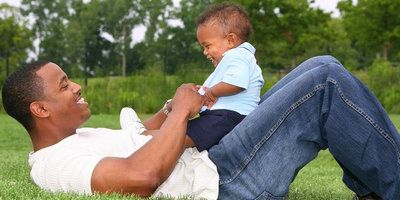The Trouble With "Baby Daddy"

ABC Family premiered a show called, “Baby Daddy,” in the summer of 2012. The acting is dumbfounding, the plots buffoonish, and I doubt that the one African American cast member cares about the fool he’s making of himself as long as his checks clear. But my beef is not with Taj Mowry. This is clearly a case of Don’t hate the player, hate the game. I am not knocking mindless television. I have stayed home plenty of Friday nights to watch the TGIF lineup on ABC. As silly as Family Matters, Perfect Strangers, Full House and Step-by-Step were, I doubt anyone was offended by their silly titles. But the people who chose to call their show “Baby Daddy” stepped across a line and I have to call them on it before this year comes to an end.
I will never forget how I felt, as the then single mother of two, the night Whitney Houston, beloved by so many, stood up on the stage at the Shrine Auditorium in 1998 at the Soul Train Music Awards, thirty-seven miles away from where I lived at the time, and called the R&B singer Bobby Brown her “baby daddy.” She was receiving an Outstanding Career Achievement Award and of course, she had the right to say whatever she wanted. But in that moment the African American community was watching. Without realizing what she had done, our diva, our voice, had just given her stamp of approval to that unfortunate phrase. What made it worse, she was married at the time to her child’s father. Bobby Brown was her husband, and they appeared to be very much in love.
(Read: A Domestic Dream: Re-Imagining Black Motherhood)
At that time, I was five years into the backhand of my second child’s father. He beat me every weekend he drank, which was every weekend. Despite the abuse, I wanted to be married, and I couldn’t understand Ms. Houston’s choice of words. People in the audience laughed, as did she. My heart sank on hearing someone I considered a class act use terminology so degrading.
Baby Daddy was coined in the urban communities with the explosion of young unwed mothers and fathers in the late 80’s and early 90’s. According to Childtrendsdatabank.org, the percentage of births to unmarried women had increased dramatically from 5.3% in 1960 to 32.2% in 1995. As long as the couples remained together, they called each other boyfriend and girlfriend. When they broke up, the man started calling the mother of his child his “baby mama” – almost always combined with the dismissive put-down “just.” “She’s just my baby mama” signified that the man had moved on and was available for another relationship. Distressingly, women found the flip-side term, “baby daddy,” equally useful, and the phrases caught on and spread like viruses, carrying with them their derogatory subtext of abandonment and irresponsibility.
(Read: Missing Daddies, Angry Mamas, and a Self-Perpetuating Cycle)
Stereotypes drain humanity from the targets of the stereotyping, even when the victims are complicit in their own victimization. No, it is not all right to use the phrases “baby mama” or “baby daddy” for cheap laughs, even when black people do it. These phrases describe real-life situations that can have unhappy consequences for everyone involved, not least the children the words refer to, if only obliquely.
A TV show like “Baby Daddy” mindlessly invites viewers to use this inherently offensive term without understanding what they are saying. Sure, it gets laughs, but so did a lot of once-popular entertainment routines, like blackface minstrelsy and funny-talking “Chinamen,” that we no longer tolerate in the national conversation. I know I can be accused of having no sense of humor about this – after all, it’s only a dumb, pseudo-hip title that will hopefully be forgotten by next season. And what do I know anyway? I’m just a baby mama.
Sharisse T. Smith

No comments: